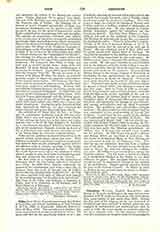

Odin, JOHN MARY, Lazarist missionary, first Bishop of Galveston and second Archbishop of New Orleans, b. February 25, 1801, at Hauteville, Ambierle, France; d. there May 25, 1870. The seventh of ten children, like most country boys he worked on his father’s f arm. His piety and love for the poor being looked on as a signof priestly vocation, he was sent when nine years of age to study Latin under his uncle, cure of Nosilly, whose death soon ended this desultory teaching. After two years at home, he studied the classics at Roanne and Verriere and was a brilliant student of philosophy at L’Argentiere and Alix. He was prompt to answer Bishop Dubourg’s appeal for volunteers for the Louisiana mission. Reaching New Orleans in June, 1822, he was sent to the seminary of the Iazarists, The Barrens, 80 miles from St. Louis, Mo., to complete his theological studies. There he joined the Lazarists. (Clarke in his lives of deceased bishops of the U.S. erroneously states that he entered at an early age in Paris.) He was ordained priest May 4, 1824, and to parish duties were added those of teaching. In vacation he preached to the Indians on the Arkansas River, for whose conversion he was most eager. In 1825 he was at times in charge of the seminary, college, and parish. He also gave missions to non-Catholics and to the Indians, until, his health failing, it was decided to send him abroad, where he could also gather recruits and funds for the missions. Accompanying Bishop Rosati to the second Council of Baltimore as theologian, he was commissioned by the council to bring its decrees to Rome for approval. Two years were spent abroad in the interest of “his poor America“. Pastoral work, chiefly at Cape Girardeau, where he opened a school (1838), and missions occupied the next five years. Sent to Texas in 1840 as vice-prefect by his provincial visitor, Father Timon, whom the Holy See had made prefect Apostolic of the new republic, he began the hardest kind of labor among Catholics, many of whom had fallen away amid the disorders accompanying the change of government, and among non-catholics and the fierce Comanche Indians. His gentleness and self-sacrifice wrought wonders. His great work was early recognized and he was nominated to the coadjutorship of Detroit but declined. A year later he was named titular Bishop of Claudiopolis and Vicar Apostolic of Texas. He was consecrated March 6, 1842. He had already succeeded with Father Timon’s help in having the Republic recognize the Church‘s right to the possessions that were hers under the Mexican government:. In 1845 he went to Europe and secured many recruits for his mission. In 1847 Texas was made a diocese and Bishop Odin’s see was fixed at Galveston. On the death of Archbishop Blanc of New Orleans, he was promoted to that see February 15, 1861. Neither his age nor infirmities kept him from a vigilant care of his flock. War had wrought havoc during his time in Texas, the civil war scourged his archdiocese now. His influence was extraordinary among the Catholic soldiers. Pius IX wrote to him in the South, as to Archbishop Hughes in the North, to use their influence for peace. His Apostolic labors were interrupted only by journeys to Europe in the interest of his archdiocese. Despite greatly impaired health he went to the Vatican Council. At Rome he grew so ill that he was granted leave to return to Heauteville where he died.
B. RANDOLPH

